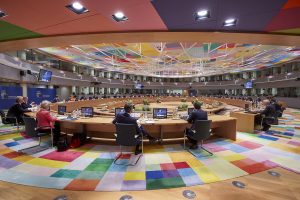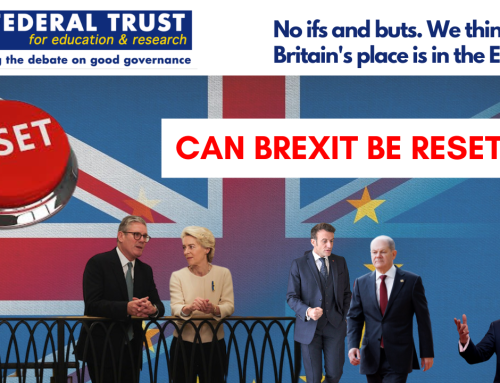
Roundtable Special European Council (17/07/20, Bruxelles); Copyright: EU
This article was first published in the Brussels Times.
The European Council has agreed the next multi-annual financial framework but postponed a decision about how to make the new recovery funds conditional on respect for democracy, human rights and the rule of law. This is regrettable.
Europe is not just facing a health crisis but also the virus of populism. The recovery plan aims to mitigate the social and economic consequences of the pandemic. But an opportunity has been lost to slow the slide into authoritarianism in Hungary, and to stem the deteriorating rule of law situation in Poland and elsewhere.
Allowing EU member states to openly flout the EU’s ground rules, while continuing to receive cash transfers (with no further questions asked), is a recipe for disaster.
As MEP Dacian Ciolos, Leader of the Renew Group, said in a statement before the European Council meeting: “The EU is not an ATM, it is a community of values driven by the needs of our citizens.”
The Council decision states that they will “revert to the matter later” (para. 23 of the summit conclusions) but in the meantime, the EU must find other ways to ensure member states respect democracy and the rule of law.
One important and under-rated mechanism is through the agency of civil society campaigners and organisations. They hold governments to account and are playing a vital role in making sure that government action during the pandemic is legal, proportionate and necessary.
MEDEL Europe, Magistrats our la démocratie et les libertés, is an association of judges and public prosecutors. In January, its President, Filipe Marques, a Portuguese judge, joined demonstrations against rule of law abuses in Poland.
An organisation such as MEDEL Europe does not take to the streets lightly. As Filipe Marques said in an interview for New Europeans:
“Europe is based on common constitutional traditions and common values. In order to protect it, we need a truly independent judiciary in which citizens can see their right upheld. Without the rule of law, we cannot say that Europe is truly free.”
Meanwhile in Hungary, the government passed a law restricting funds to NGOs from foreign donors. The law was over-turned in the EU Court of Justice following a challenge by the campaign group Civilizáció.
In a ground-breaking article mapping the deterioration of civic space in central Europe, written for The Carnegie Endowment in March 2020, Giada Negri wrote:
“Government restrictions on civil society are an important feature of democratic regression across Europe. Yet European civil society has begun to respond to the assault on civic freedoms.”
Marta Lempart in Poland, one of the leaders of the Polish Women’s Strike (PWS), catches this well when she says: “When the police turn up and say: ‘Attention! Attention! We are the police!’, we say ‘Attention! Attention! We are the citizens!’”
Since the outbreak of the pandemic, the assault on our freedoms has been exacerbated. The need for a strong response from civil society is clear.
Nevertheless, the European Commission is not planning to increase funding of its Rights and Values programme. In fact, until very recently, the Commission was intending to cut the programme by 20% in the next multiannual budget.
Under pressure from NGOs, Justice Commissioner Didier Reynders has announced a rethink. That is to be welcomed, but he now needs to go further.
Not only has the pandemic brought out the worst autocratic tendencies in EU member states such as Poland and Hungary, it has also shown how dependent we are on a strong civil society to build resilience at a time of crisis.
Civil society actors, volunteer carers and health workers have been at the front end of combating COVID, often putting their own lives at risk.
There is not just a deepening of the crisis, there is a multiplication of the issues that require attention. LGBT+ rights are under renewed attack in Poland following the re-election of President Duda.
The pandemic also opens the door to a wide-ranging set of abuses of privacy with regard to data collection and surveillance, for example.
State power is being ratchetted up without countervailing measures to protect our freedoms. Some leaders, such as Viktor Orban in Hungary, clearly see COVID-19 as a chance to grab power. They may have no intention of ever giving it back.
With the doubling of the EU budget in the coming years, the European Commission has an important lever it can use to ensure that EU member states respect democracy, human rights and the rule of law.
Using that lever wisely will be as important to the resilience of the European project as the recovery programme itself.
The European Parliament has recommended that funding for the Rights and Values programme should be increased to at least three times its current level.
In a follow-up letter to European Commission President Ursula von der Leyen, European Civic Forum President Jean Marc Roirant and Ewa Kulik-Bielinska, Executive Director of the Stefan Bartory Foundation write:
“We expect that the Commission will now take concrete necessary steps towards the EU Council to ensure that the Rights and Values programme will benefit from these much-needed budget allocations.”
That is an important message, and it goes to the heart of the issue. The resources are there to invest in safeguarding the fundamental rights and core European values. But what about the political will?
How the Commission chooses to respond will have a powerful impact on the resilience of the EU as a safe space for democracy as well as on the quality of the rights and freedoms enjoyed by all of us who live there.





